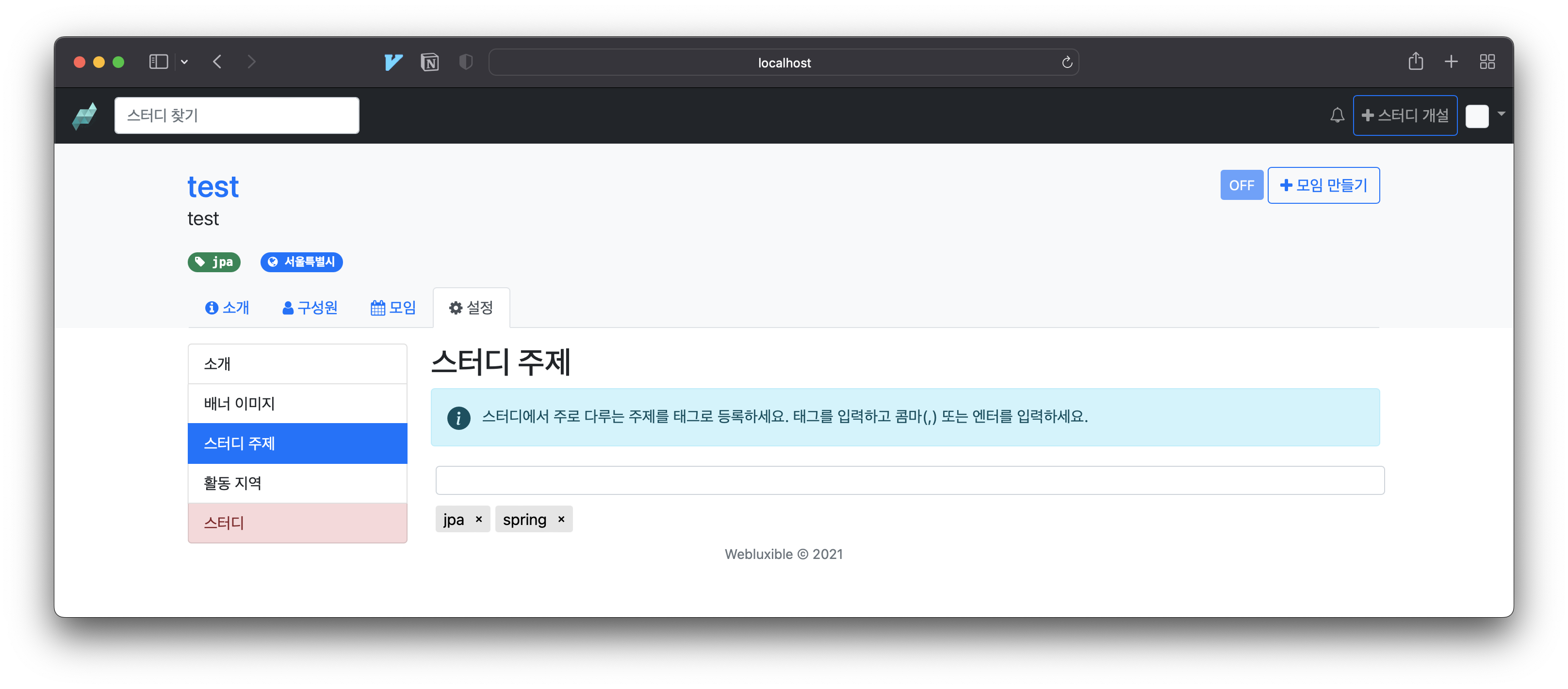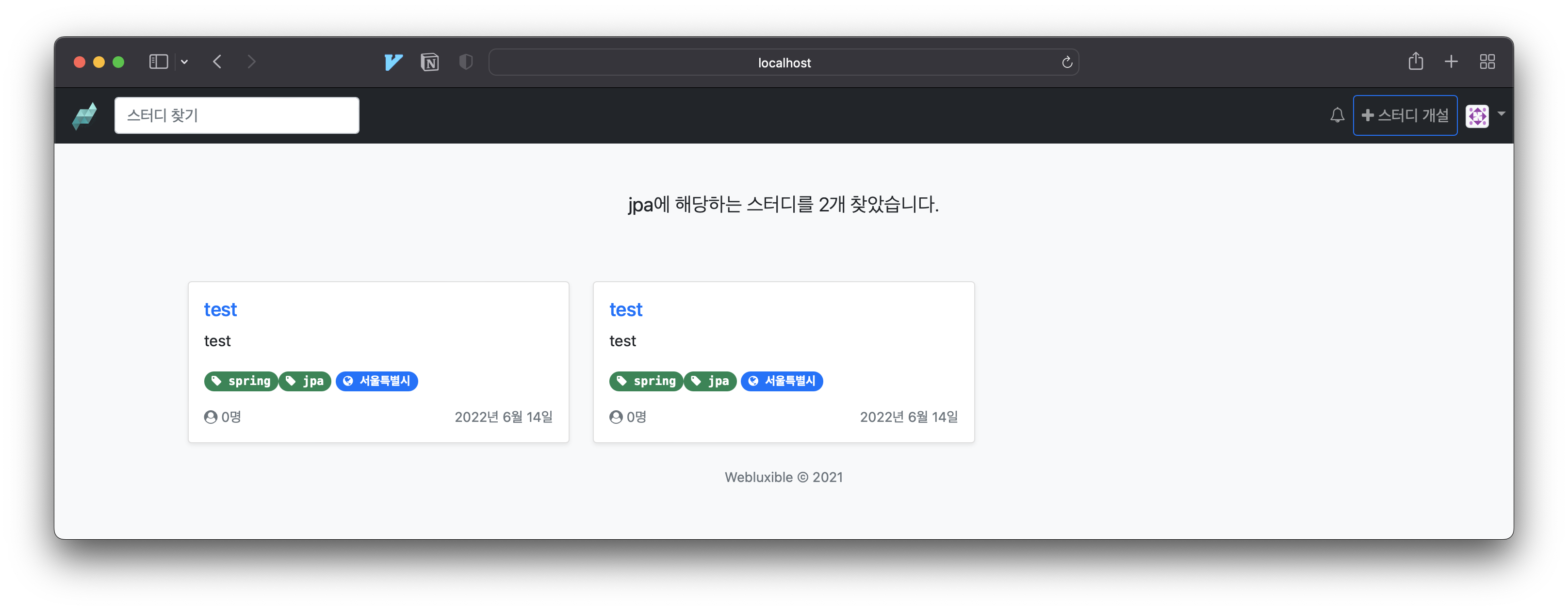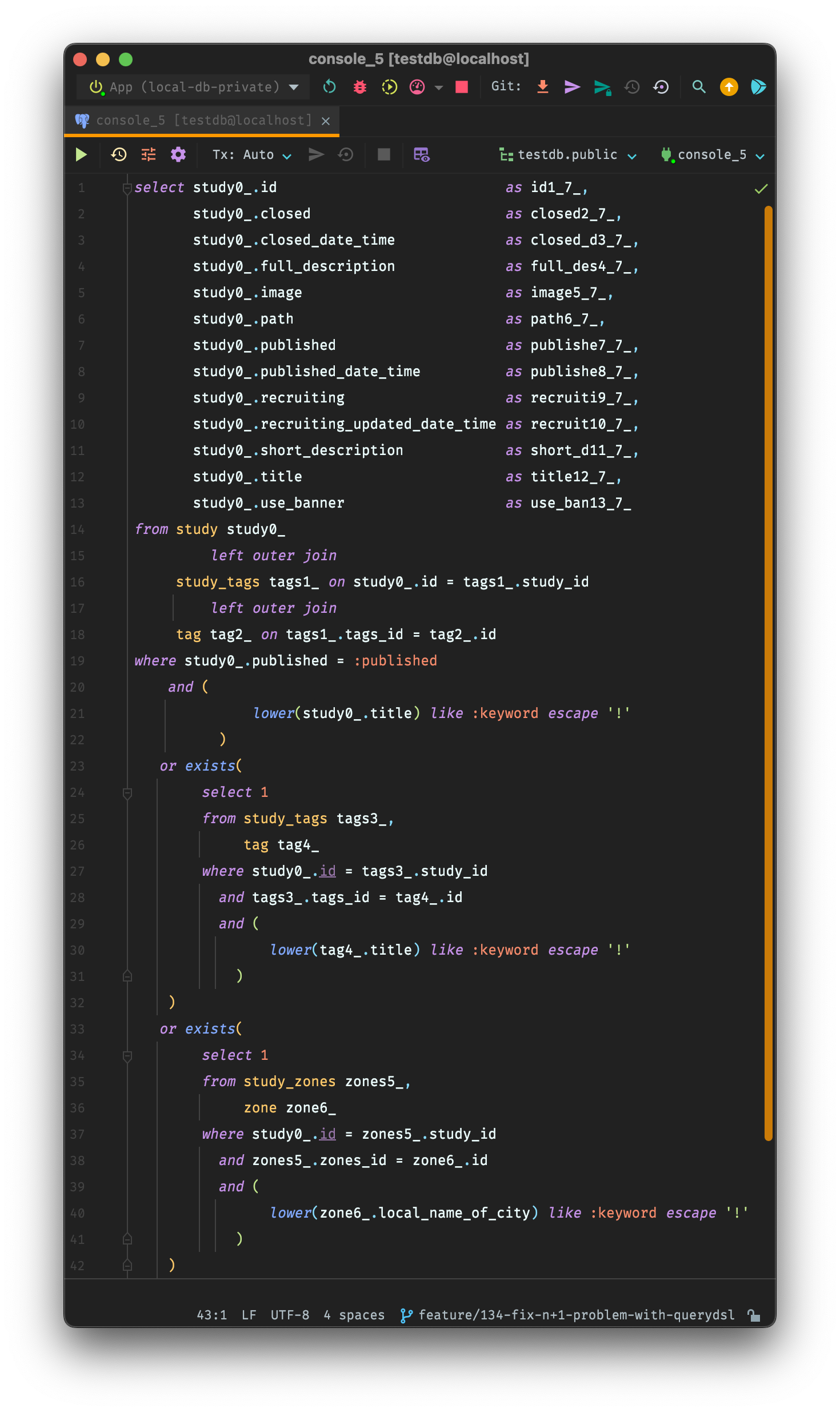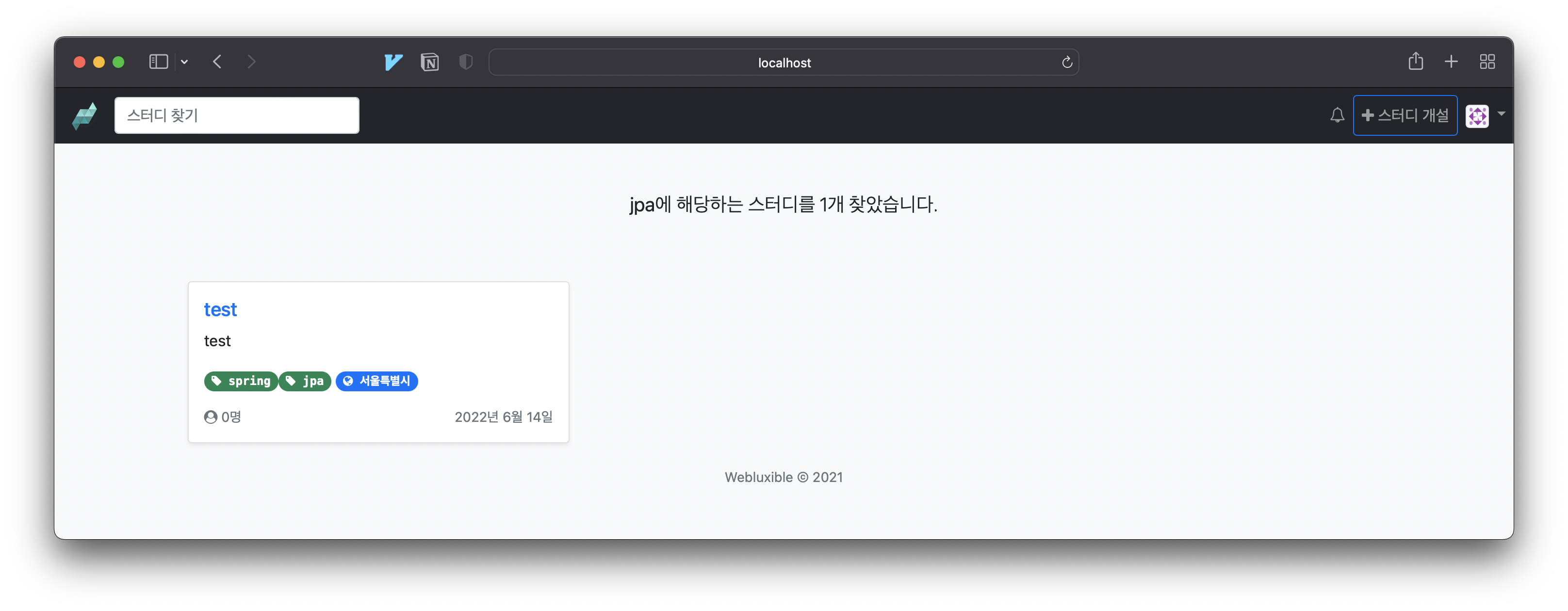티스토리 뷰
스프링 부트 웹 애플리케이션 제작(68): querydsl n+1 problem
Jaime.Lee 2022. 6. 19. 10:30

본 포스팅은 백기선님의 스프링과 JPA 기반 웹 애플리케이션 개발 강의를 참고하여 작성하였습니다.
소스 코드는 여기 있습니다. (commit hash: e7a6ed7)> git clone https://github.com/lcalmsky/spring-boot-app.git > git checkout e7a6ed7ℹ️ squash merge를 사용해 기존 branch를 삭제하기로 하여 앞으로는 commit hash로 포스팅 시점의 소스 코드를 공유할 예정입니다.
Overview
querydsl에서 발생하는 n+1 problem을 해결합니다.
해결 방법
left (outer) join
- fetchJoin을 하기 위해서
- 첫 번째(left) 테이블에 연관 관계가 있는 모든 데이터를 가져옴
- 연관 관계가 없으면 null로 채워서
- 첫 번째 테이블 컬럼만 본다면 중복 row 발생
fetchJoin
- join 관계의 데이터도 같이 가져옴
distinct
- 중복 제거
왜 이 세 가지를 추가해야하는지 순차적으로 확인해보겠습니다.
left join만 추가
StudyRepositoryExtensionImpl 클래스에 쿼리하는 부분에 left join만 추가합니다.
src/main/java/io/lcalmsky/app/modules/study/infra/repository/StudyRepositoryExtensionImpl.java
// 생략
public class StudyRepositoryExtensionImpl extends QuerydslRepositorySupport implements StudyRepositoryExtension {
// 생략
@Override
public List<Study> findByKeyword(String keyword) {
QStudy study = QStudy.study;
JPQLQuery<Study> query = from(study)
.where(study.published.isTrue()
.and(study.title.containsIgnoreCase(keyword))
.or(study.tags.any().title.containsIgnoreCase(keyword))
.or(study.zones.any().localNameOfCity.containsIgnoreCase(keyword)))
.leftJoin(study.tags, QTag.tag); // study 기준으로 tag를 join
return query.fetch();
}
}JPA나 querydsl과 상관없이 SQL을 잘 아시는 분들은 저렇게 했을 때 어떤 점이 잘못될 수 있는지 잘 아실 겁니다.
우선 어떤 점이 잘못되었는지 애플리케이션을 실행해서 확인해보겠습니다.
관심 분야가 두 개 이상인
study를 사전에 준비해야 합니다.

스터디 주제를 jpa, spring 두 가지로 설정하였습니다.
이제 jpa로 검색해보면(현재 DB에는 예시를 위해 jpa를 tags로 가지는 study가 한 개만 존재),

이렇게 같은 스터디가 두 개 중복해서 노출됩니다.
로그에 쿼리를 확인해보면,
Study 쿼리
select
study0_.id as id1_7_,
study0_.closed as closed2_7_,
study0_.closed_date_time as closed_d3_7_,
study0_.full_description as full_des4_7_,
study0_.image as image5_7_,
study0_.path as path6_7_,
study0_.published as publishe7_7_,
study0_.published_date_time as publishe8_7_,
study0_.recruiting as recruiti9_7_,
study0_.recruiting_updated_date_time as recruit10_7_,
study0_.short_description as short_d11_7_,
study0_.title as title12_7_,
study0_.use_banner as use_ban13_7_
from
study study0_
left outer join
study_tags tags1_
on study0_.id=tags1_.study_id
left outer join
tag tag2_
on tags1_.tags_id=tag2_.id
where
study0_.published=?
and (
lower(study0_.title) like ? escape '!'
)
or exists (
select
1
from
study_tags tags3_,
tag tag4_
where
study0_.id=tags3_.study_id
and tags3_.tags_id=tag4_.id
and (
lower(tag4_.title) like ? escape '!'
)
)
or exists (
select
1
from
study_zones zones5_,
zone zone6_
where
study0_.id=zones5_.study_id
and zones5_.zones_id=zone6_.id
and (
lower(zone6_.local_name_of_city) like ? escape '!'
)
)알림 쿼리
select
count(notificati0_.id) as col_0_0_
from
notification notificati0_
where
notificati0_.account_account_id=?
and notificati0_.checked=?tags 쿼리
select
tags0_.study_id as study_id1_10_0_,
tags0_.tags_id as tags_id2_10_0_,
tag1_.id as id1_12_1_,
tag1_.title as title2_12_1_
from
study_tags tags0_
inner join
tag tag1_
on tags0_.tags_id=tag1_.id
where
tags0_.study_id=?zones 쿼리
select
zones0_.study_id as study_id1_11_0_,
zones0_.zones_id as zones_id2_11_0_,
zone1_.id as id1_13_1_,
zone1_.city as city2_13_1_,
zone1_.local_name_of_city as local_na3_13_1_,
zone1_.province as province4_13_1_
from
study_zones zones0_
inner join
zone zone1_
on zones0_.zones_id=zone1_.id
where
zones0_.study_id=?members 쿼리
select
members0_.study_id as study_id1_9_0_,
members0_.members_account_id as members_2_9_0_,
account1_.account_id as account_1_0_1_,
account1_.created_date as created_2_0_1_,
account1_.last_modified_date as last_mod3_0_1_,
account1_.email as email4_0_1_,
account1_.email_token as email_to5_0_1_,
account1_.email_token_generated_at as email_to6_0_1_,
account1_.is_valid as is_valid7_0_1_,
account1_.joined_at as joined_a8_0_1_,
account1_.nickname as nickname9_0_1_,
account1_.study_created_by_email as study_c10_0_1_,
account1_.study_created_by_web as study_c11_0_1_,
account1_.study_registration_result_by_email as study_r12_0_1_,
account1_.study_registration_result_by_web as study_r13_0_1_,
account1_.study_updated_by_email as study_u14_0_1_,
account1_.study_updated_by_web as study_u15_0_1_,
account1_.password as passwor16_0_1_,
account1_.bio as bio17_0_1_,
account1_.company as company18_0_1_,
account1_.image as image19_0_1_,
account1_.job as job20_0_1_,
account1_.location as locatio21_0_1_,
account1_.url as url22_0_1_
from
study_members members0_
inner join
account account1_
on members0_.members_account_id=account1_.account_id
where
members0_.study_id=?총 다섯 번의 쿼리가 발생했음을 확인할 수 있습니다.
특히 주의해서 봐야 할 쿼리는 첫 번째 쿼리인데요, 해당 쿼리를 DB에 직접 조회해보겠습니다.



DB에서 마찬가지로 두 개의 row가 반환되는 것을 확인할 수 있습니다.
study 기준으로 left join을 하기 때문에 study가 가진 tags의 개수에 따라 중복된 row가 여러 개 발생할 수 있게 됩니다.
더 자세히 확인하려면 select 문에 tag.title을 추가하여 확인할 수 있습니다.
쿼리 및 결과 보기
select study0_.id as id1_7_,
study0_.closed as closed2_7_,
study0_.closed_date_time as closed_d3_7_,
study0_.full_description as full_des4_7_,
study0_.image as image5_7_,
study0_.path as path6_7_,
study0_.published as publishe7_7_,
study0_.published_date_time as publishe8_7_,
study0_.recruiting as recruiti9_7_,
study0_.recruiting_updated_date_time as recruit10_7_,
study0_.short_description as short_d11_7_,
study0_.title as title12_7_,
study0_.use_banner as use_ban13_7_,
tag2_.title as tag_title /* 추가 */
from study study0_
left outer join
study_tags tags1_ on study0_.id = tags1_.study_id
left outer join
tag tag2_ on tags1_.tags_id = tag2_.id
where study0_.published = :published
and (
lower(study0_.title) like :keyword escape '!'
)
or exists(
select 1
from study_tags tags3_,
tag tag4_
where study0_.id = tags3_.study_id
and tags3_.tags_id = tag4_.id
and (
lower(tag4_.title) like :keyword escape '!'
)
)
or exists(
select 1
from study_zones zones5_,
zone zone6_
where study0_.id = zones5_.study_id
and zones5_.zones_id = zone6_.id
and (
lower(zone6_.local_name_of_city) like :keyword escape '!'
)
)

또한, study의 데이터만 가져왔기 때문에(fetch join을 하지 않았기 때문에) tags, zones, members에 대한 쿼리가 추가로 발생하고 있는 것도 확인할 수 있습니다.
fetch join 추가
먼저 동일한 클래스에서 쿼리하는 부분에 fetchJoin()을 추가하여 쿼리가 줄어드는지 확인해보겠습니다.
// 생략
public class StudyRepositoryExtensionImpl extends QuerydslRepositorySupport implements StudyRepositoryExtension {
// 생략
@Override
public List<Study> findByKeyword(String keyword) {
QStudy study = QStudy.study;
JPQLQuery<Study> query = from(study)
.where(study.published.isTrue()
.and(study.title.containsIgnoreCase(keyword))
.or(study.tags.any().title.containsIgnoreCase(keyword))
.or(study.zones.any().localNameOfCity.containsIgnoreCase(keyword)))
.leftJoin(study.tags, QTag.tag)
.fetchJoin(); // fetchJoin 추가
return query.fetch();
}
}
로그(쿼리) 확인
2022-06-17 03:20:44.316 DEBUG 46618 --- [nio-8080-exec-9] org.hibernate.SQL :
select
study0_.id as id1_7_0_,
tag2_.id as id1_12_1_,
study0_.closed as closed2_7_0_,
study0_.closed_date_time as closed_d3_7_0_,
study0_.full_description as full_des4_7_0_,
study0_.image as image5_7_0_,
study0_.path as path6_7_0_,
study0_.published as publishe7_7_0_,
study0_.published_date_time as publishe8_7_0_,
study0_.recruiting as recruiti9_7_0_,
study0_.recruiting_updated_date_time as recruit10_7_0_,
study0_.short_description as short_d11_7_0_,
study0_.title as title12_7_0_,
study0_.use_banner as use_ban13_7_0_,
tag2_.title as title2_12_1_,
tags1_.study_id as study_id1_10_0__,
tags1_.tags_id as tags_id2_10_0__
from
study study0_
left outer join
study_tags tags1_
on study0_.id=tags1_.study_id
left outer join
tag tag2_
on tags1_.tags_id=tag2_.id
where
study0_.published=?
and (
lower(study0_.title) like ? escape '!'
)
or exists (
select
1
from
study_tags tags3_,
tag tag4_
where
study0_.id=tags3_.study_id
and tags3_.tags_id=tag4_.id
and (
lower(tag4_.title) like ? escape '!'
)
)
or exists (
select
1
from
study_zones zones5_,
zone zone6_
where
study0_.id=zones5_.study_id
and zones5_.zones_id=zone6_.id
and (
lower(zone6_.local_name_of_city) like ? escape '!'
)
)
2022-06-17 03:20:44.317 TRACE 46618 --- [nio-8080-exec-9] o.h.type.descriptor.sql.BasicBinder : binding parameter [1] as [BOOLEAN] - [true]
2022-06-17 03:20:44.318 TRACE 46618 --- [nio-8080-exec-9] o.h.type.descriptor.sql.BasicBinder : binding parameter [2] as [VARCHAR] - [%jpa%]
2022-06-17 03:20:44.318 TRACE 46618 --- [nio-8080-exec-9] o.h.type.descriptor.sql.BasicBinder : binding parameter [3] as [VARCHAR] - [%jpa%]
2022-06-17 03:20:44.318 TRACE 46618 --- [nio-8080-exec-9] o.h.type.descriptor.sql.BasicBinder : binding parameter [4] as [VARCHAR] - [%jpa%]
2022-06-17 03:20:44.325 DEBUG 46618 --- [nio-8080-exec-9] org.hibernate.SQL :
select
count(notificati0_.id) as col_0_0_
from
notification notificati0_
where
notificati0_.account_account_id=?
and notificati0_.checked=?
2022-06-17 03:20:44.325 TRACE 46618 --- [nio-8080-exec-9] o.h.type.descriptor.sql.BasicBinder : binding parameter [1] as [BIGINT] - [86]
2022-06-17 03:20:44.325 TRACE 46618 --- [nio-8080-exec-9] o.h.type.descriptor.sql.BasicBinder : binding parameter [2] as [BOOLEAN] - [false]
2022-06-17 03:20:44.337 DEBUG 46618 --- [nio-8080-exec-9] org.hibernate.SQL :
select
zones0_.study_id as study_id1_11_0_,
zones0_.zones_id as zones_id2_11_0_,
zone1_.id as id1_13_1_,
zone1_.city as city2_13_1_,
zone1_.local_name_of_city as local_na3_13_1_,
zone1_.province as province4_13_1_
from
study_zones zones0_
inner join
zone zone1_
on zones0_.zones_id=zone1_.id
where
zones0_.study_id=?
2022-06-17 03:20:44.338 TRACE 46618 --- [nio-8080-exec-9] o.h.type.descriptor.sql.BasicBinder : binding parameter [1] as [BIGINT] - [99]
2022-06-17 03:20:44.344 DEBUG 46618 --- [nio-8080-exec-9] org.hibernate.SQL :
select
members0_.study_id as study_id1_9_0_,
members0_.members_account_id as members_2_9_0_,
account1_.account_id as account_1_0_1_,
account1_.created_date as created_2_0_1_,
account1_.last_modified_date as last_mod3_0_1_,
account1_.email as email4_0_1_,
account1_.email_token as email_to5_0_1_,
account1_.email_token_generated_at as email_to6_0_1_,
account1_.is_valid as is_valid7_0_1_,
account1_.joined_at as joined_a8_0_1_,
account1_.nickname as nickname9_0_1_,
account1_.study_created_by_email as study_c10_0_1_,
account1_.study_created_by_web as study_c11_0_1_,
account1_.study_registration_result_by_email as study_r12_0_1_,
account1_.study_registration_result_by_web as study_r13_0_1_,
account1_.study_updated_by_email as study_u14_0_1_,
account1_.study_updated_by_web as study_u15_0_1_,
account1_.password as passwor16_0_1_,
account1_.bio as bio17_0_1_,
account1_.company as company18_0_1_,
account1_.image as image19_0_1_,
account1_.job as job20_0_1_,
account1_.location as locatio21_0_1_,
account1_.url as url22_0_1_
from
study_members members0_
inner join
account account1_
on members0_.members_account_id=account1_.account_id
where
members0_.study_id=?
2022-06-17 03:20:44.344 TRACE 46618 --- [nio-8080-exec-9] o.h.type.descriptor.sql.BasicBinder : binding parameter [1] as [BIGINT] - [99]
로그가 길어서 접어두었지만 tags에 관한 추가 쿼리가 발생하지 않은 것을 확인할 수 있습니다.
이렇게 fetchJoin은 join한 결과를 한 번에 같이 가져올 수 있게 해줍니다.
나머지 zones, members 또한 추가해 준 뒤 확인해보겠습니다.
// 생략
public class StudyRepositoryExtensionImpl extends QuerydslRepositorySupport implements StudyRepositoryExtension {
// 생략
@Override
public List<Study> findByKeyword(String keyword) {
QStudy study = QStudy.study;
JPQLQuery<Study> query = from(study)
.where(study.published.isTrue()
.and(study.title.containsIgnoreCase(keyword))
.or(study.tags.any().title.containsIgnoreCase(keyword))
.or(study.zones.any().localNameOfCity.containsIgnoreCase(keyword)))
.leftJoin(study.tags, QTag.tag).fetchJoin()
.leftJoin(study.zones, QZone.zone).fetchJoin() // zones join 및 fetchJoin
.leftJoin(study.members, QAccount.account).fetchJoin(); // members join 및 fetchJoin
return query.fetch();
}
}로그를 다시 확인해보면,
로그(쿼리) 전체 보기
2022-06-17 03:24:04.045 DEBUG 46618 --- [nio-8080-exec-9] org.hibernate.SQL :
select
study0_.id as id1_7_0_,
tag2_.id as id1_12_1_,
zone4_.id as id1_13_2_,
account6_.account_id as account_1_0_3_,
study0_.closed as closed2_7_0_,
study0_.closed_date_time as closed_d3_7_0_,
study0_.full_description as full_des4_7_0_,
study0_.image as image5_7_0_,
study0_.path as path6_7_0_,
study0_.published as publishe7_7_0_,
study0_.published_date_time as publishe8_7_0_,
study0_.recruiting as recruiti9_7_0_,
study0_.recruiting_updated_date_time as recruit10_7_0_,
study0_.short_description as short_d11_7_0_,
study0_.title as title12_7_0_,
study0_.use_banner as use_ban13_7_0_,
tag2_.title as title2_12_1_,
tags1_.study_id as study_id1_10_0__,
tags1_.tags_id as tags_id2_10_0__,
zone4_.city as city2_13_2_,
zone4_.local_name_of_city as local_na3_13_2_,
zone4_.province as province4_13_2_,
zones3_.study_id as study_id1_11_1__,
zones3_.zones_id as zones_id2_11_1__,
account6_.created_date as created_2_0_3_,
account6_.last_modified_date as last_mod3_0_3_,
account6_.email as email4_0_3_,
account6_.email_token as email_to5_0_3_,
account6_.email_token_generated_at as email_to6_0_3_,
account6_.is_valid as is_valid7_0_3_,
account6_.joined_at as joined_a8_0_3_,
account6_.nickname as nickname9_0_3_,
account6_.study_created_by_email as study_c10_0_3_,
account6_.study_created_by_web as study_c11_0_3_,
account6_.study_registration_result_by_email as study_r12_0_3_,
account6_.study_registration_result_by_web as study_r13_0_3_,
account6_.study_updated_by_email as study_u14_0_3_,
account6_.study_updated_by_web as study_u15_0_3_,
account6_.password as passwor16_0_3_,
account6_.bio as bio17_0_3_,
account6_.company as company18_0_3_,
account6_.image as image19_0_3_,
account6_.job as job20_0_3_,
account6_.location as locatio21_0_3_,
account6_.url as url22_0_3_,
members5_.study_id as study_id1_9_2__,
members5_.members_account_id as members_2_9_2__
from
study study0_
left outer join
study_tags tags1_
on study0_.id=tags1_.study_id
left outer join
tag tag2_
on tags1_.tags_id=tag2_.id
left outer join
study_zones zones3_
on study0_.id=zones3_.study_id
left outer join
zone zone4_
on zones3_.zones_id=zone4_.id
left outer join
study_members members5_
on study0_.id=members5_.study_id
left outer join
account account6_
on members5_.members_account_id=account6_.account_id
where
study0_.published=?
and (
lower(study0_.title) like ? escape '!'
)
or exists (
select
1
from
study_tags tags7_,
tag tag8_
where
study0_.id=tags7_.study_id
and tags7_.tags_id=tag8_.id
and (
lower(tag8_.title) like ? escape '!'
)
)
or exists (
select
1
from
study_zones zones9_,
zone zone10_
where
study0_.id=zones9_.study_id
and zones9_.zones_id=zone10_.id
and (
lower(zone10_.local_name_of_city) like ? escape '!'
)
)
2022-06-17 03:24:04.046 TRACE 46618 --- [nio-8080-exec-9] o.h.type.descriptor.sql.BasicBinder : binding parameter [1] as [BOOLEAN] - [true]
2022-06-17 03:24:04.046 TRACE 46618 --- [nio-8080-exec-9] o.h.type.descriptor.sql.BasicBinder : binding parameter [2] as [VARCHAR] - [%jpa%]
2022-06-17 03:24:04.047 TRACE 46618 --- [nio-8080-exec-9] o.h.type.descriptor.sql.BasicBinder : binding parameter [3] as [VARCHAR] - [%jpa%]
2022-06-17 03:24:04.047 TRACE 46618 --- [nio-8080-exec-9] o.h.type.descriptor.sql.BasicBinder : binding parameter [4] as [VARCHAR] - [%jpa%]
2022-06-17 03:24:04.058 DEBUG 46618 --- [nio-8080-exec-9] org.hibernate.SQL :
select
count(notificati0_.id) as col_0_0_
from
notification notificati0_
where
notificati0_.account_account_id=?
and notificati0_.checked=?
2022-06-17 03:24:04.059 TRACE 46618 --- [nio-8080-exec-9] o.h.type.descriptor.sql.BasicBinder : binding parameter [1] as [BIGINT] - [86]
2022-06-17 03:24:04.059 TRACE 46618 --- [nio-8080-exec-9] o.h.type.descriptor.sql.BasicBinder : binding parameter [2] as [BOOLEAN] - [false]
study와 notification에 대한 쿼리 딱 두 개만 발생하는 것을 확인할 수 있습니다.
fetchJoin을 사용하지 않았다면 tags, zones, members를 접근할 때마다 쿼리가 발생하게 되므로 스터디의 개수가 n일 때 3n + 1개의 쿼리가 발생하게 됩니다.
distinct 추가
쿼리의 수는 줄였지만 아직도 애플리케이션에서는 중복된 스터디를 보여주고 있습니다.
마지막에 distinct()를 추가하여 중복된 row를 제거할 수 있습니다.
// 생략
public class StudyRepositoryExtensionImpl extends QuerydslRepositorySupport implements StudyRepositoryExtension {
// 생략
@Override
public List<Study> findByKeyword(String keyword) {
QStudy study = QStudy.study;
JPQLQuery<Study> query = from(study)
.where(study.published.isTrue()
.and(study.title.containsIgnoreCase(keyword))
.or(study.tags.any().title.containsIgnoreCase(keyword))
.or(study.zones.any().localNameOfCity.containsIgnoreCase(keyword)))
.leftJoin(study.tags, QTag.tag).fetchJoin()
.leftJoin(study.zones, QZone.zone).fetchJoin()
.leftJoin(study.members, QAccount.account).fetchJoin()
.distinct(); // distinct 추가
return query.fetch();
}
}
애플리케이션에서 결과를 확인해보면,

하나의 고유한 결과를 가져오는 것을 확인할 수 있습니다.
쿼리를 확인해보면
select
distinct study0_.id as id1_7_0_,
tag2_.id as id1_12_1_,
zone4_.id as id1_13_2_,
account6_.account_id as account_1_0_3_,
study0_.closed as closed2_7_0_,
study0_.closed_date_time as closed_d3_7_0_,
study0_.full_description as full_des4_7_0_,
study0_.image as image5_7_0_,
study0_.path as path6_7_0_,
study0_.published as publishe7_7_0_,
study0_.published_date_time as publishe8_7_0_,
study0_.recruiting as recruiti9_7_0_,
study0_.recruiting_updated_date_time as recruit10_7_0_,
study0_.short_description as short_d11_7_0_,
study0_.title as title12_7_0_,
study0_.use_banner as use_ban13_7_0_,
tag2_.title as title2_12_1_,
tags1_.study_id as study_id1_10_0__,
tags1_.tags_id as tags_id2_10_0__,
zone4_.city as city2_13_2_,
zone4_.local_name_of_city as local_na3_13_2_,
zone4_.province as province4_13_2_,
zones3_.study_id as study_id1_11_1__,
zones3_.zones_id as zones_id2_11_1__,
account6_.created_date as created_2_0_3_,
account6_.last_modified_date as last_mod3_0_3_,
account6_.email as email4_0_3_,
account6_.email_token as email_to5_0_3_,
account6_.email_token_generated_at as email_to6_0_3_,
account6_.is_valid as is_valid7_0_3_,
account6_.joined_at as joined_a8_0_3_,
account6_.nickname as nickname9_0_3_,
account6_.study_created_by_email as study_c10_0_3_,
account6_.study_created_by_web as study_c11_0_3_,
account6_.study_registration_result_by_email as study_r12_0_3_,
account6_.study_registration_result_by_web as study_r13_0_3_,
account6_.study_updated_by_email as study_u14_0_3_,
account6_.study_updated_by_web as study_u15_0_3_,
account6_.password as passwor16_0_3_,
account6_.bio as bio17_0_3_,
account6_.company as company18_0_3_,
account6_.image as image19_0_3_,
account6_.job as job20_0_3_,
account6_.location as locatio21_0_3_,
account6_.url as url22_0_3_,
members5_.study_id as study_id1_9_2__,
members5_.members_account_id as members_2_9_2__
from
study study0_
left outer join
study_tags tags1_
on study0_.id=tags1_.study_id
left outer join
tag tag2_
on tags1_.tags_id=tag2_.id
left outer join
study_zones zones3_
on study0_.id=zones3_.study_id
left outer join
zone zone4_
on zones3_.zones_id=zone4_.id
left outer join
study_members members5_
on study0_.id=members5_.study_id
left outer join
account account6_
on members5_.members_account_id=account6_.account_id
where
study0_.published=?
and (
lower(study0_.title) like ? escape '!'
)
or exists (
select
1
from
study_tags tags7_,
tag tag8_
where
study0_.id=tags7_.study_id
and tags7_.tags_id=tag8_.id
and (
lower(tag8_.title) like ? escape '!'
)
)
or exists (
select
1
from
study_zones zones9_,
zone zone10_
where
study0_.id=zones9_.study_id
and zones9_.zones_id=zone10_.id
and (
lower(zone10_.local_name_of_city) like ? escape '!'
)
)select 이후 distinct가 추가된 것을 확인할 수 있습니다.
하지만 이 쿼리를 DB에 조회해보면 이전과 동일하게 두 개의 row를 반환하는데요, 실제로 동작하는 방식은 distinct가 쿼리에 영향을 주지 않고 ResultTransformer를 이용해 결과에서 고유한 값을 걸러냈기 때문입니다.
쿼리를 자세히 보시면 distinct가 study에 대해 적용된 것이 아니라 전체 컬럼에 적용되었기 때문인데요, 결과 조회 후 걸러내는 방식이 맘에 들지 않는다면 여기서 최적화를 적용할 수 있습니다.
최적화 방법은?
먼저 쿼리에서는 distinct를 제거하고 ResultTransformer를 제공하는 방법이 있습니다. 쿼리에 distinct가 포함되어있으면 성능에 영향을 주기 때문입니다.
(특히 study의 description까지 모두 비교해가며 고유의 값을 찾아야하기 때문에)
이를 적용하기 위해선 projection을 사용해야 하는데 강의에서는 다루고 있지 않습니다.
관심있으신 분들은 이 포스팅을 참고해주세요.
저도 나중에 시간이 되면 추가 포스팅을 통해 최적화 해보고, 데이터를 충분히 늘려 놓은 상태에서 쿼리 시간을 비교해 볼 예정입니다.
'SpringBoot > Web Application 만들기' 카테고리의 다른 글
| 스프링 부트 웹 애플리케이션 제작(70): 검색 뷰 개선 및 정렬 기능 추가 (0) | 2022.06.21 |
|---|---|
| 스프링 부트 웹 애플리케이션 제작(69): 검색 결과에 페이징 적용하기 (0) | 2022.06.20 |
| 스프링 부트 웹 애플리케이션 제작(67): 스터디 검색 기능 구현 (0) | 2022.06.16 |
| 스프링 부트 웹 애플리케이션 제작(66): 모임 알림 기능 구현 (0) | 2022.06.15 |
| 스프링 부트 웹 애플리케이션 제작(65): 스터디 변경 알림 기능 구현 (0) | 2022.06.14 |
- Total
- Today
- Yesterday
- gRPC
- spring boot app
- Spring Boot JPA
- JPA
- spring boot application
- Jackson
- Linux
- 함께 자라기 후기
- 스프링부트
- 스프링 부트 애플리케이션
- intellij
- 스프링 부트 회원 가입
- 클린 아키텍처
- JSON
- 스프링 부트 튜토리얼
- r
- Spring Boot
- leetcode
- proto3
- Spring Data JPA
- 알고리즘
- 스프링 부트
- spring boot jwt
- 함께 자라기
- Spring Boot Tutorial
- Java
- 헥사고날 아키텍처
- 스프링 데이터 jpa
- QueryDSL
- @ManyToOne
| 일 | 월 | 화 | 수 | 목 | 금 | 토 |
|---|---|---|---|---|---|---|
| 1 | 2 | 3 | 4 | 5 | 6 | 7 |
| 8 | 9 | 10 | 11 | 12 | 13 | 14 |
| 15 | 16 | 17 | 18 | 19 | 20 | 21 |
| 22 | 23 | 24 | 25 | 26 | 27 | 28 |

